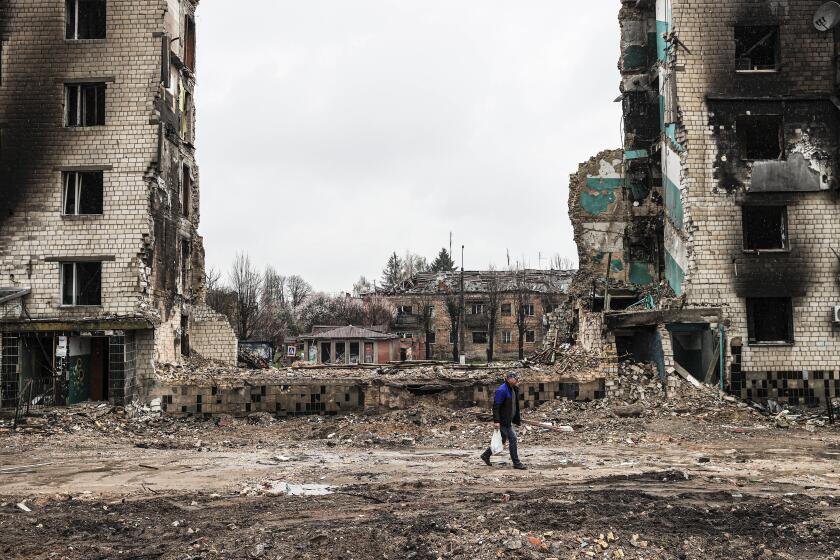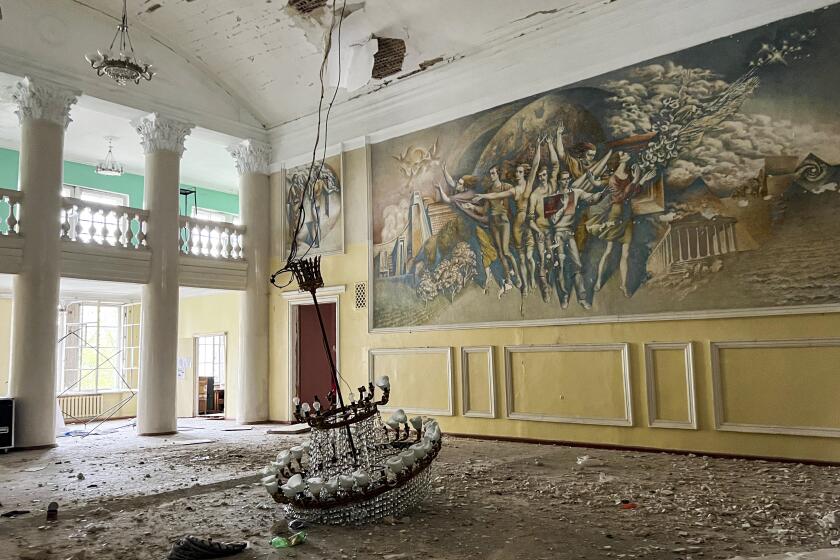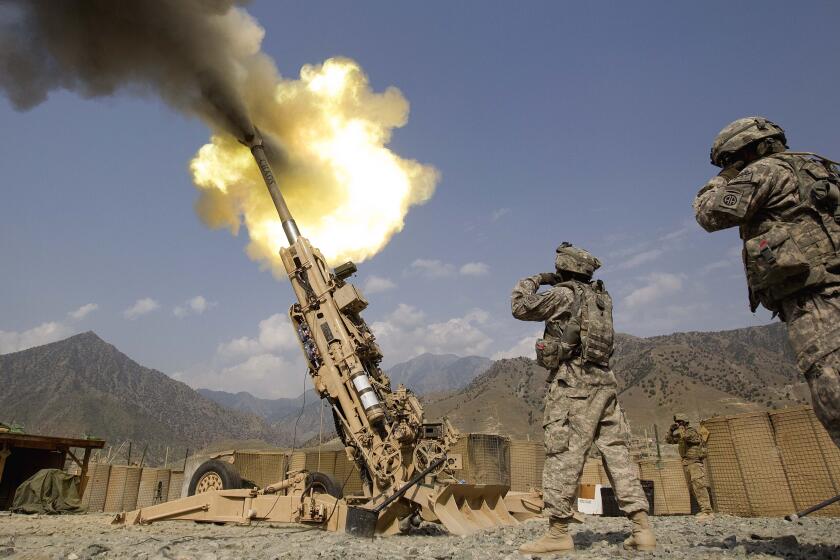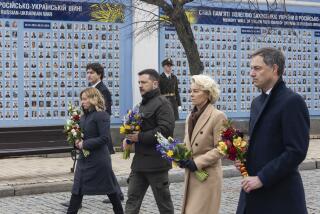Ukraine fends off Russian attacks as Mariupol, Odesa are pounded; top U.S. officials to visit Kyiv
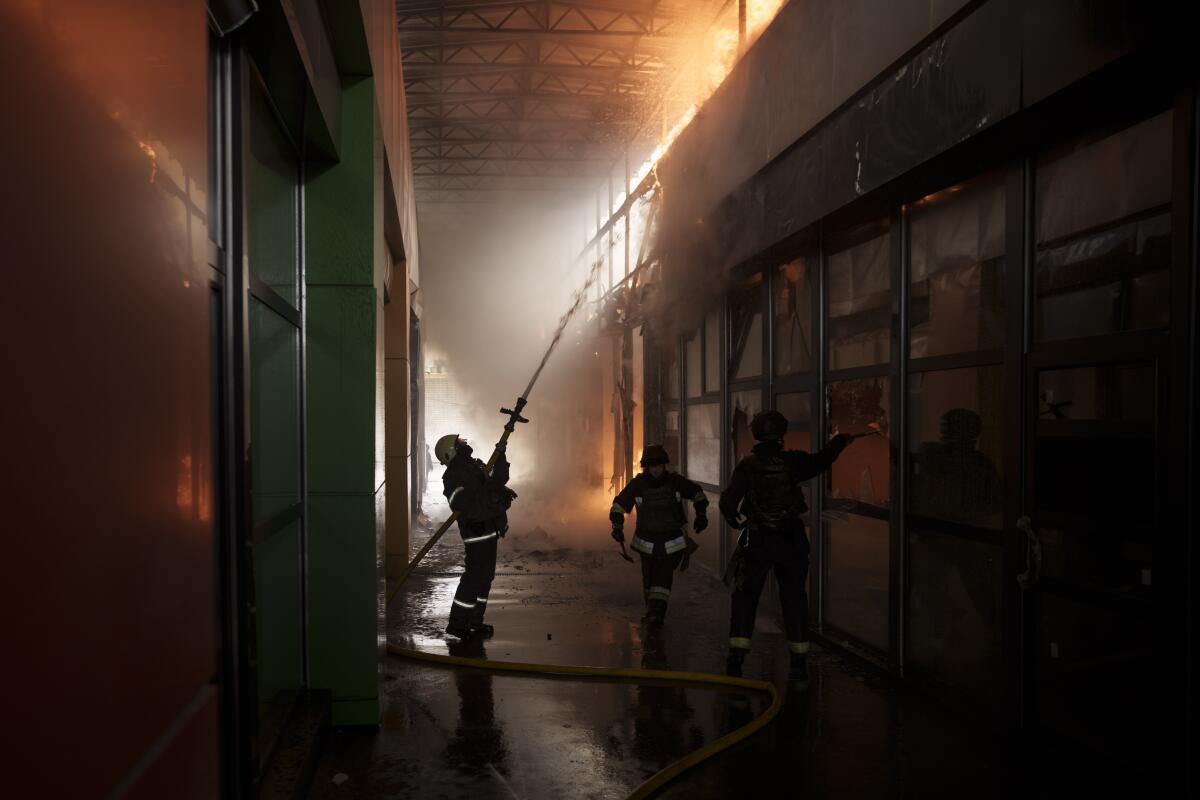
KRAMATORSK, Ukraine — Russian and Ukrainian troops faced off Saturday along a 300-mile battlefront in the country’s east, where Ukraine said it beat back numerous attacks but faced renewed shelling in the crippled city of Mariupol, the Black Sea port of Odesa and beyond.
Ukrainian President Volodymyr Zelensky, meanwhile, said that two senior U.S. officials — Secretary of State Antony J. Blinken and Secretary of Defense Lloyd J. Austin III — would arrive Sunday in the capital, Kyiv, in what would be the highest-level delegation dispatched by President Biden since the war began two months ago.
Several other world leaders have made the trip in recent weeks to meet with Zelensky, ramping up pressure on Washington to follow suit. Neither the Pentagon nor the State Department publicly confirmed the trip.
Moscow is pressing ahead with an offensive in Ukraine’s eastern industrial heartland as it seeks to gain full control over the provinces of Donetsk and Luhansk, known together as the Donbas.
Western analysts and officials said Russia has not made major territorial gains since Monday, when both sides said that the fighting in the east — Moscow’s main focus — had entered a new phase.
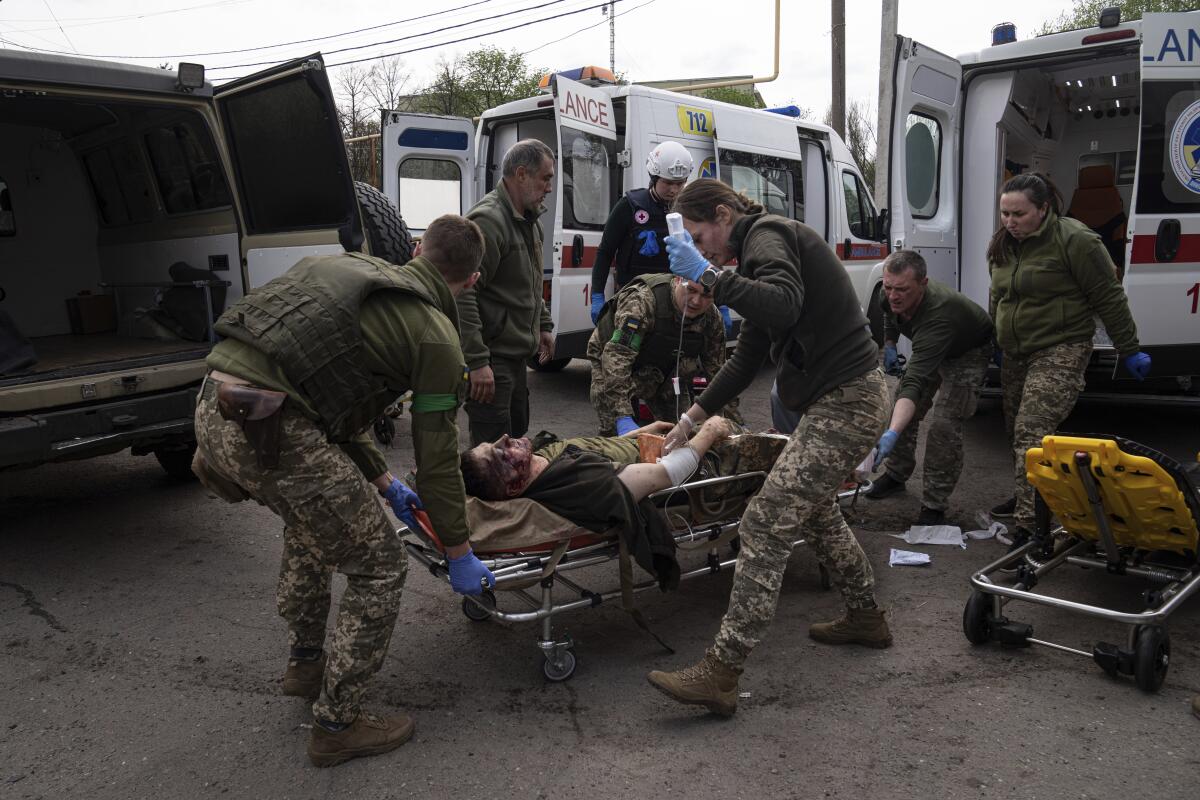
In a statement Saturday, the Ukrainian Defense Ministry said that a day earlier the military had hit a Russian command post near Kherson, a port city on the Black Sea that Russia seized early in the war and is a key part of its strategy to take territory in the south. The statement — which said that two Russian generals had been killed and that another was badly wounded and evacuated — could not be independently verified.
In the southeast, the devastated port city of Mariupol remains contested, Ukraine said Saturday, despite Russian President Vladimir Putin’s recent claim of victory. But the situation was dire: Russia continued to bombard the giant steelworks plant where holdout Ukrainian forces and an unknown number of civilians were holed up. Late Saturday, Ukrainian officials said Russian forces attempted to storm the factory complex in a final all-out effort to crush resistance.
Russian forces have more artillery, tanks and heavy fighting units than Ukraine, but they have been plagued by problems as they enter a pivotal battle for eastern Ukraine.
A new British military intelligence assessment early Saturday said heavy fighting was still occurring in Mariupol, despite Russia’s “stated conquest” of the city.
Another assessment, from the Washington-based Institute for the Study of War, predicted that Russia would “starve out” the remaining defenders and the civilians trapped alongside. Putin ordered a tight blockade of the steel plant, the Ukrainians’ final redoubt, which is a sprawling collection of above- and below-ground structures.
Communications have been largely severed for weeks with Mariupol, strategically located on the Sea of Azov, and the horrors of weeks of bombardment and besiegement are only beginning to be fully uncovered. Satellite imagery has revealed at least one mass grave on the city’s outskirts, and the Associated Press reported that another mass burial site had been detected.
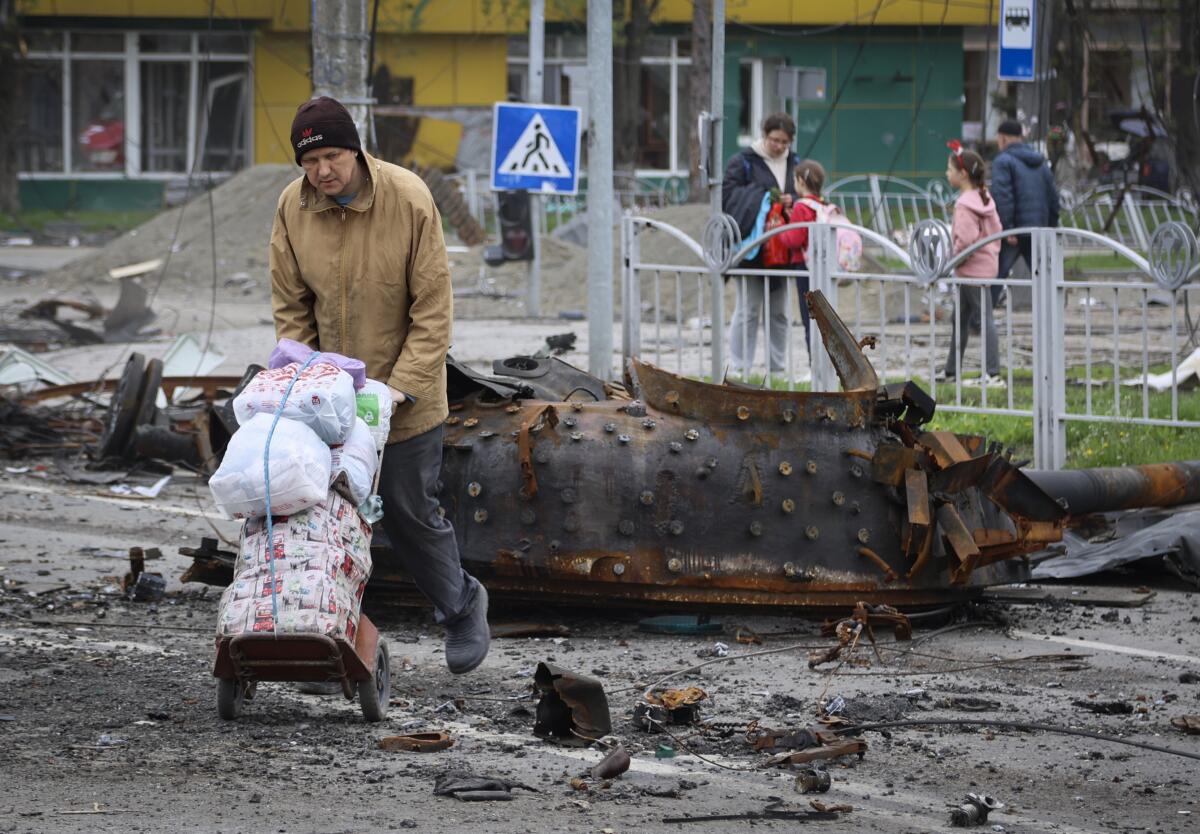
Municipal authorities have said an estimated 20,000 people have died in the siege of the city, which has lasted nearly the entire duration of the war. Control of Mariupol is vital to Russia’s aim of linking the part of the Donbas it controls with the Crimean peninsula, which it seized and annexed eight years ago.
Ukraine’s deputy prime minister, Iryna Vereshchuk, said authorities were trying to take some civilians out of Mariupol on Saturday, but she warned on Telegram that Russians were trying to divert some of those fleeing, pushing them toward Russia-controlled areas. Later reports indicated the evacuation efforts failed again.
Russia on Friday signaled a potential expansion of its war aims, with a senior military officer saying Moscow also sought a land corridor linking the Donbas to a Russian separatist territory in the neighboring country of Moldova, to the west. That would involve seizing Ukraine’s entire southern seacoast, including the coveted port city of Odesa, which would leave the country landlocked.
Indeed, Russian forces hit Odesa with a barrage of missiles. Ukrainian officials said a 3-month-old baby was among five people killed. Zelensky seemed particularly touched by the loss.
“The war started when this baby was 1 month old,” the president said. “Can you imagine what is happening? ... They are just bastards.”
It has been more than a month since Russian troops advanced on Rubizhne, a small, well-appointed city nestled in a verdant slice of land. Families have taken refuge in a bombed cultural palace.
Western governments including the U.S. administration called on Russia on Friday to respect Moldova’s sovereignty. The former Soviet republic, which is small and impoverished, said it had summoned the Russian ambassador to express “deep concern” about the comments regarding its breakaway region.
It remained unclear, though, whether the Russian general’s remarks represented a new official policy on Moscow’s war goals. Kremlin spokesman Dmitry Peskov declined to comment.
Russia’s main focus is the east, where it redeployed its forces east after failing last month to seize Kyiv.
The British military intelligence assessment of the situation in the east reported “no major gains in the last 24 hours, as Ukrainian counterattacks continue to hinder their efforts.”
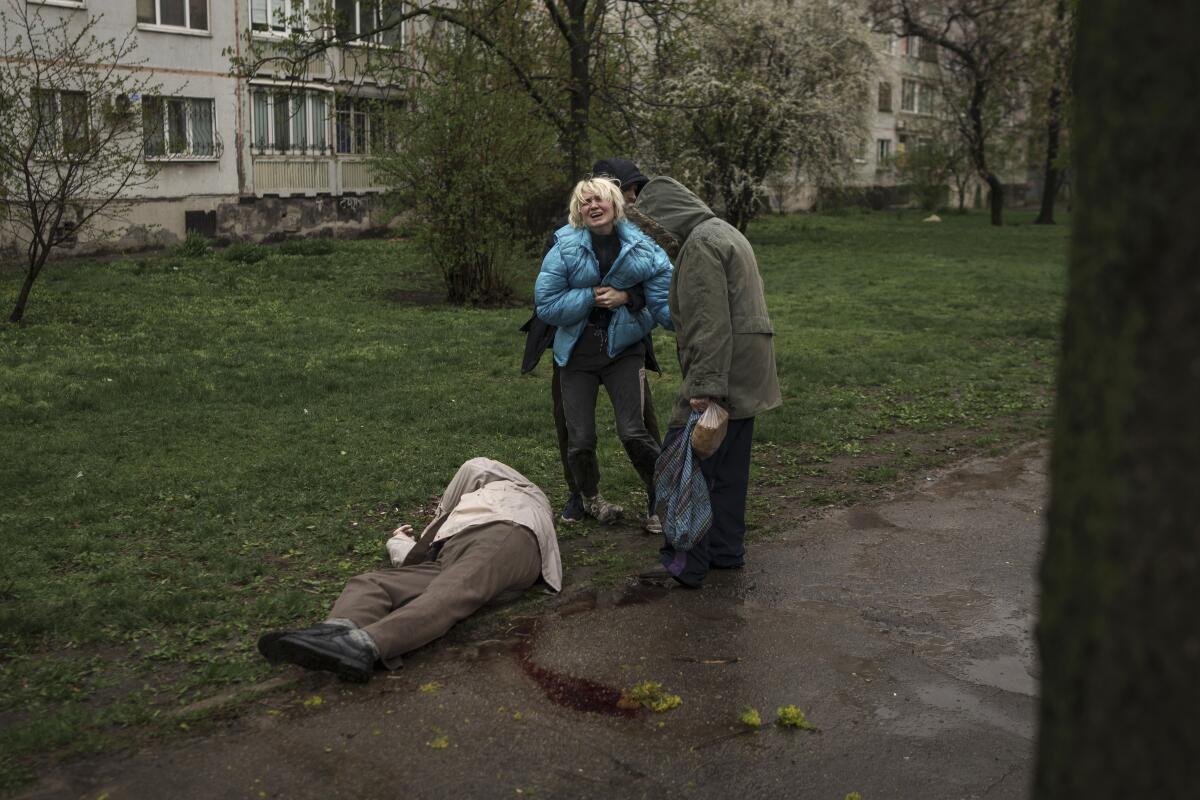
Just outside the Donbas, Ukraine’s second-largest city, Kharkiv, is partially blockaded by Russian forces, the Ukrainian military said Saturday. The city, once home to nearly 1.5 million people, has been pounded by almost nonstop bombardment for weeks.
With punishing Russian artillery fire aimed at towns and cities across the Luhansk region, its governor, Serhiy Haidai, said on television Saturday that in some areas, Ukrainian troops pulled back to new defensive lines. The front line was fluid, with some territory changing hands repeatedly.
Moscow’s forces are still massing in preparation for an expected wider attack. Ukrainian officials say some Russian units are being shifted away from Mariupol to other parts of the east. Pentagon officials had anticipated such a shift once Russia was confident it had conquered Mariupol.
President Biden’s decision to dramatically ramp up delivery of artillery guns to Ukraine comes at a potentially crucial point in the war.
With new evidence coming to light daily suggesting atrocities against civilians by Russian troops in territory they previously occupied or now control, Zelensky repeated his call for war crimes accountability.
“The occupiers are trying to achieve a primitive goal — to kill as much as possible and destroy everything they see,” Zelensky said.
Investigators are at work in Bucha and other satellite towns and suburbs of Kyiv, documenting evidence of execution-style killings of civilians and other atrocities. More than 1,200 people are believed to have been killed during a Russian occupation of areas near Kyiv lasting about a month.
The Kremlin is also coping with the aftermath of one of its biggest symbolic defeats of the war: the sinking of the flagship of its Black Sea fleet, the Moskva, in what the Kyiv government and Western military officials say was a Ukrainian missile strike.
More than a week after the ship went down, Russia’s Defense Ministry confirmed the death of one sailor and said 27 others were missing, though large numbers were still apparently unaccounted for. The crew consisted of nearly 500 sailors, and some families have taken to social media to express anguish over the still-unknown fate of loved ones among the crew.
Efforts to end the war through negotiation have so far been fruitless, but United Nations Secretary-General António Guterres is to meet in the coming week — separately — with Zelensky and Putin. The U.N. says the talks in the countries’ respective capitals will center on a cease-fire and efforts to pluck civilians from the battle zone.
Sunday is Easter for most Orthodox Christians, a major religion in both Ukraine and Russia.
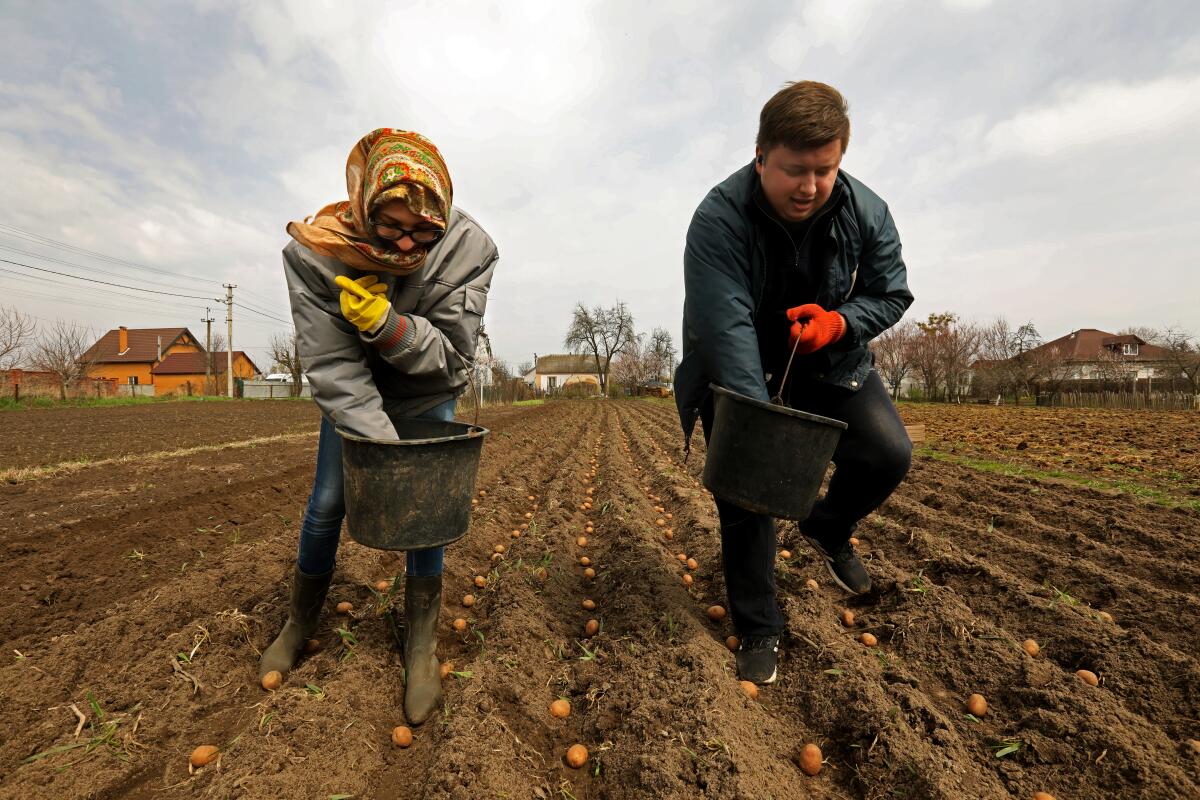
In the town of Borodyanka, near Bucha, churches were collecting donations of holiday cakes and other food. With spring in the air, Inna Korohodina, 45, was planting potatoes with her husband and daughter at the home of her parents, where the family was trapped when the Russians rolled into town last month.
“These potatoes saved our life,” she said. “If we hadn’t had the potatoes, we would have starved.”
Next door, Valentyna, 82, was also working in the garden. She had stayed alone in her house, surviving on salted cucumbers, potatoes and buckwheat, and venturing out just once, to share her only loaf of bread with a neighbor. “I was scared, but I was more worried about my children,” she said, declining to give her last name.
Less than a mile away at the city cemetery, about 50 people gathered for the funeral of a mother, father and son who died in a Russian missile attack on their apartment building. The woman, Halyna Bobrovskiy, 59, was a family doctor.
Flocks of birds flew over as the sun peeked out for the first time in many weeks.
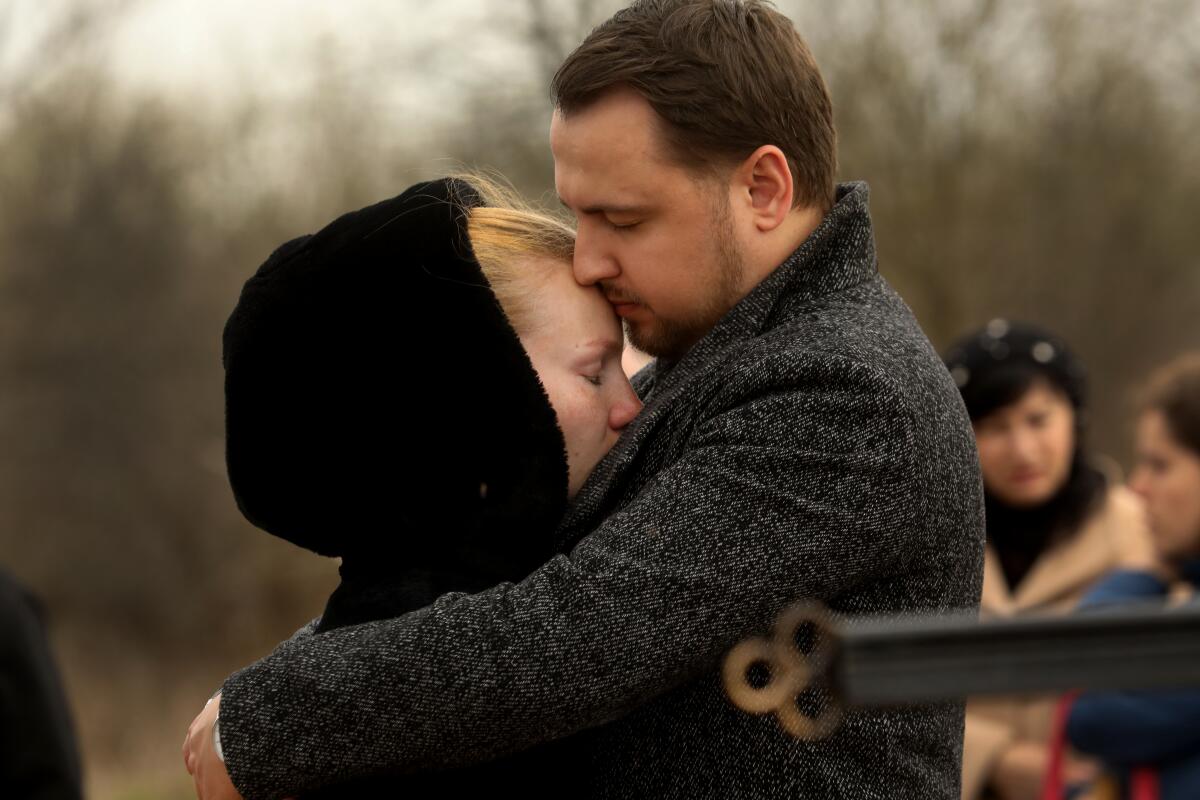
Bulos reported from Kramatorsk, Cole from Borodyanka and King from Berlin. Times staff writer Tracy Wilkinson in Washington contributed to this report.
More to Read
Sign up for Essential California
The most important California stories and recommendations in your inbox every morning.
You may occasionally receive promotional content from the Los Angeles Times.
